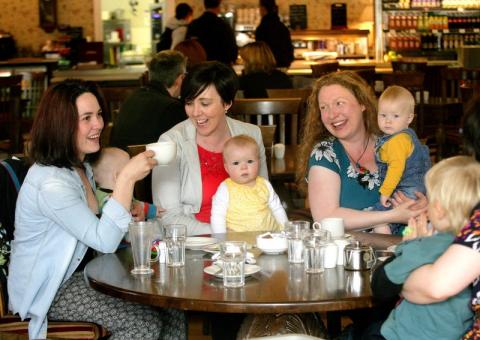Breastfeeding welcome here!

With the bank holiday approaching, many new mums will be out and about enjoying time with their families. But what do they think about breastfeeding in public and what are local businesses doing to help?
Northern Ireland has the lowest breastfeeding rates in UK and one of the lowest in Europe – 64% of mothers start breastfeeding compared with 81% in the rest of the UK, but by six weeks of age this reduces to 33% in Northern Ireland, compared with 55% in the rest of the UK.
Breastfeeding in public can be a daunting prospect, especially for a first-time mum like Rudi McClurg, 26, but she said that discovering what other mums were doing broke down that barrier.
“Sometimes if you are in a café and people are walking past and they see you breastfeeding, they don’t know where to look but no one has ever said anything to me or been very negative about it, but you do get a few looks,” Rudi said.
“I didn’t know anyone who breastfed before I started breastfeeding and it can be difficult, especially for younger mums. If I hadn’t have been to the support groups I wouldn’t have known anyone who breastfed, I wouldn’t have known what was ‘normal’ and I think if you don’t see it in public, no one will know about it and it won’t become normal.”
Helping mums like Rudi is the Public Health Agency’s (PHA) ‘Breastfeeding Welcome Here’ scheme. Started in 2005, the scheme now has over 300 members with popular local attractions, businesses and council facilities across Northern Ireland increasing the social acceptability of breastfeeding by supporting mums who want, and need, to feed when out and about.
Janet Calvert, Regional Breastfeeding Lead for the PHA, explained: “The companies and attractions who are signed up to the initiative display a sticker in the window of their premises to let mums know that they are welcome to feed in all areas of the premises and will not be asked to stop breastfeeding. Staff are made aware to be supportive and the businesses also display a certificate to show their participation.”
The Ulster Folk and Transport Museum is one venue that has signed up to the scheme.
The museum’s Visitor Services Manager, Paula Bradley, said: “We are very pleased to sign up to the Public Health Agency’s important ‘Breastfeeding Welcome Here’ scheme. The museum has a strong focus on families and offering the very best visitor experience for everyone, including breastfeeding mothers. We are very aware of the importance for breastfeeding mums planning a visit to the museum to know they are coming to a place where they will be warmly welcomed.”
Janet Calvert explained that increasing Northern Ireland’s low breastfeeding rates involves raising awareness about breastfeeding and wellbeing, and promoting social acceptability of breastfeeding in public.
“Breastfeeding in public has hit the headlines lately with the Department of Health indicating plans for a public consultation on laws that would give clarity on the rights of mothers to breastfeed in public,” Janet said.
“In Northern Ireland less than a third of all mothers are still breastfeeding by the time their baby is six weeks old and one of the reasons why so many women stop breastfeeding is a lack of social acceptability. The PHA ‘Breastfeeding Welcome Here’ scheme is part of a programme of initiatives which aims to create supportive environments for breastfeeding as is recognised in Breastfeeding – a great start: A strategy for Northern Ireland 2013–2023.
“The time to normalise breastfeeding and create the right conditions for mothers to breastfeed in comfort, wherever they are, is now well overdue. Breastfeeding should not be a cause for concern, as mothers just want to be able to feed their baby where they need to and to make breastfeeding part of everyday life. The PHA would like to commend those businesses that are helping and doing their bit to support mums.”
Breastfeeding also carries with it many health benefits. Scientific evidence has shown that babies who are breastfed are generally at a lower risk of having infections, allergies, obesity, diabetes and cot death. Women who breastfeed may also have a lower risk of breast cancer, ovarian cancer and osteoporosis.
Bangor mum Rudi said that despite her mum choosing to bottle-feed her as a baby, she took the decision to breastfeed her son Caelan, who is 10 months old.
“The health benefits outweigh that of formula but it’s also a lot easier – you don’t have to lug about bottles, sterilise the bottles and do all of the cleaning. The bond that we have got from it as well has been great, in terms of the emotional side,” Rudi continued.
“It can be very demanding at the beginning but I think as long as you are prepared for that then things can run that bit more smoothly. The first six weeks can feel like you’re constantly feeding and it can get quite hard but, again, support is really key in being successful at breastfeeding.”
A list of companies who participate in the Breastfeeding Welcome Here scheme can be found at www.breastfedbabies.org
